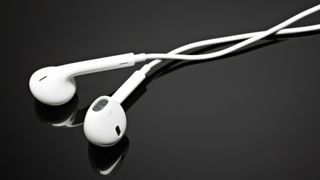The most unfounded Apple rumour is the most sensible yet
Although the clues have been there for a while

Secret.ly is becoming an interesting new home for tech leaks. It's just damn annoying that there's no way of validating any of them.
But the latest one to get the internet buzzing might be the most sensible we've heard in a long time. We're 99.99999% sure that Apple is getting into health tech, and this sounds like a pretty plausible strategy.
"Apple's new EarPods will have sensors in them, for heart rate and blood pressure. Also iBeacons so they don't get lost. They will require the lightning port, it's why the audio jack was moved to the bottom."
Earputers
So let's break this down.
First, earphones having sensors in them isn't a crazy idea at all. The latest claim might be totally unfounded but we already know that Apple's has had an idea along these lines – just look at this patent.
In fact, it goes back even further than that. This patent from all the way back in 2008, as pointed out by MacRumours, also describes a way of monitoring physiological data via headphones.
LG's even put the idea into action already with its own heart rate monitor earphones, which relay data to its wrist-based Lifeband Touch.
Get daily insight, inspiration and deals in your inbox
Get the hottest deals available in your inbox plus news, reviews, opinion, analysis and more from the TechRadar team.
The heart rate monitors built into current wearables, such as the Samsung Gear Fit and TomTom Runner Cardio, use a green light Mio optical sensor to track changes in blood flow.
That's all well and good but the flaw is that they sit on one of the busiest parts of your body. It's no surprise that we've had some pretty crazy readings in the middle of a jog – it's just a lot more difficult to be accurate when reading from a wrist.
Taking a reading from inside the ear makes a lot of more sense, especially when you take into account the fact that most of us already listen to music when running. Plus it's one less thing to strap one when heading out the door.
Sound idea
There was another interesting comment made by our Secret.ly tipster a little later on: "It's meant to be a gateway product to the other one."
One commenter asked if this "other one" was the iWatch. The response: "Name isn't final yet. But yes. That one."
However great the iWatch (or iBand, whatever takes your fancy right now) is, it's going to be a tough sell in this currently-awkward wearable market. But fitness will be the key to unlocking the door. Google has Google Now. Apple has health.
Perhaps the iWatch will have a heart rate monitor in it too, although if these EarPods do actually exist, it probably doesn't need one. The watch/band will probably be better placed for general day-to-day movement tracking, perhaps employing a variant of Nike's FuelPoint system.
But the iWatch will also be a companion device to the iPhone. So the idea could be to bundle in Apple's new EarPods with the iPhone 6 and wean people onto the idea that they also need Apple's wearable.
After all, nothing gets people opening their wallets as quickly as thier own health. As our anonymous tipster put it in a comment, "Home medical devices are… a poor market today. But everybody has a body they would like to look after."
So how will these mythical earbuds speak to our phones? "They will require the lightning port, it's why the audio jack was moved to the bottom."
This makes sense too. LG's earphones require a "medallion" to process data but Apple should be able to send everything through its proprietary connector without the need for an added accessory.
And what's that? I can only use approved Apple earphones on my iPhone 6? Wow, it's almost like someone planned for this very thing to happen.
Hugh Langley is the ex-News Editor of TechRadar. He had written for many magazines and websites including Business Insider, The Telegraph, IGN, Gizmodo, Entrepreneur Magazine, WIRED (UK), TrustedReviews, Business Insider Australia, Business Insider India, Business Insider Singapore, Wareable, The Ambient and more.
Hugh is now a correspondent at Business Insider covering Google and Alphabet, and has the unfortunate distinction of accidentally linking the TechRadar homepage to a rival publication.

